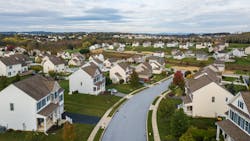DOE awards $90 million to projects accelerating modern energy code adoption
The U.S. Department of Energy (DOE) has awarded $90 million in funding to 27 projects across 26 states and D.C. that will help transition buildings to the latest energy efficiency standards. Recipients of the competitive award will provide technical assistance to updating state and local building codes, which would create a projected savings of $138 billion on utility bills and reduce 900 million metric tons of carbon dioxide emissions by 2040, according to a July 12 press release from the DOE. This is the approximate amount of annual emissions output by 108 million homes.
“Cutting emissions from buildings across America and ensuring they’re more energy efficient are critical components of President Biden’s plan to tackle the climate crisis and create cleaner and healthier communities,” said U.S. Secretary of Energy Jennifer M. Granholm in the release.
In the U.S., commercial and residential buildings are responsible for 35% of the country’s carbon emissions. Houses built to modern energy codes are 40% more efficient than houses built 15 years ago, and thus have a reduced impact both on the environment and on homeowner budgets. However, two out of every three communities have not adopted the latest building codes, according to DOE’s press release.
The awards are part of the Biden-Harris administration’s National Initiative to Advance Building Codes, announced in June 2022, which allocated $225 million in Bipartisan Infrastructure Law funding for the DOE to accelerate the implementation of updated building energy codes and create jobs while prioritizing the needs of disadvantaged communities. The funding opportunity for this particular round of grants was announced in December 2022 and titled Bipartisan Infrastructure Law: Resilient and Efficient Codes Implementation. DOE initially expected to award $45 million to between 10 and 30 projects.
The 27 projects were selected through a “stakeholder engagement process and target partnerships across the range of energy code stakeholders who play an important role supporting the successful implementation of building codes,” according to the release. Awardees have proposed initiatives to accelerate modern code adoption, including in the areas of workforce development, community engagement, research and data collection, energy, equity and environmental justice, and increased support for compliance and enforcement.
Several award recipients are described below; a complete list of award recipients is available here.
- The American Council for an Energy-Efficient Economy, in Washington, D.C., will receive $9.6 million to establish a National Energy Codes Collaborative that will “empower states and jurisdictions to effectively and sustainably implement updated cost-effective building energy codes through technical assistance, community engagement, focused local strategy development, and peer-to-peer collaboration and convenings.
- The Metropolitan Energy Center, in Kansas City, Mo., will receive $6.8 million to leverage its multistate network of 30 regional, state, and local community partners not typically engaged in energy code efforts to conduct outreach and workforce development in rural and disadvantaged communities.
- The Pennsylvania Department of Environmental Protection will receive $3 million to develop energy code technical trainings and building science training programs at career and technical high schools and community colleges across the state.
- ClearlyEnergy, in Severna Park, Md., will receive $2.9 million to create regional building performance standard cohorts to implement building energy efficiency programs in small, rural, and Justice40 communities and potentially adjacent jurisdictions.
For more news, projects, and profiles in the smart buildings ecosystem, subscribe to the SBT newsletter and follow us on LinkedIn, Twitter, and Facebook.
